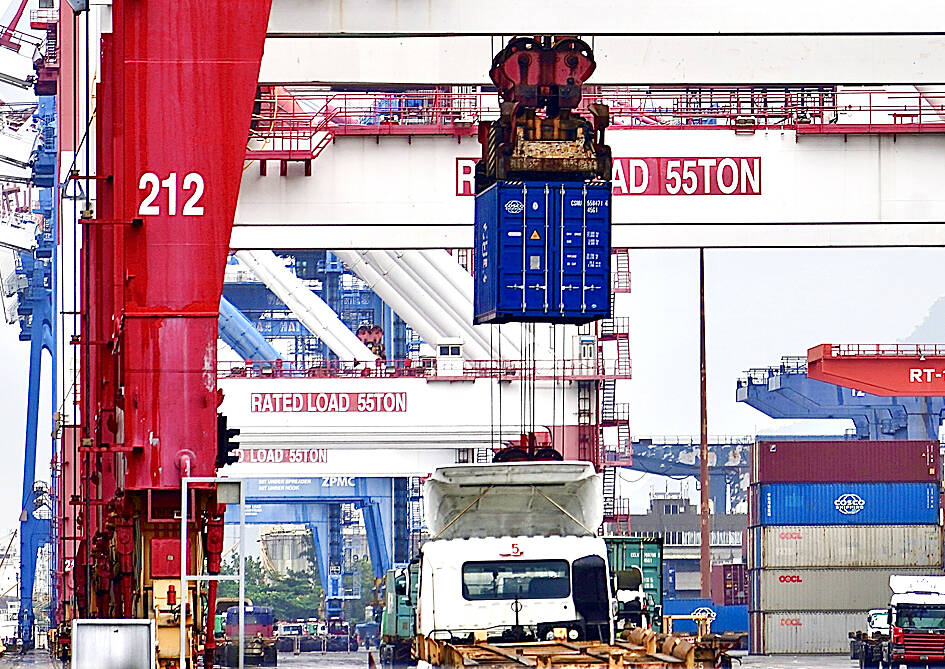Export orders last month expanded 19.5 percent year-on-year to US$60.02 billion, the seventh straight month of double-digit percentage growth and the highest ever for August, the Ministry of Economic Affairs said yesterday.
Last month’s figure decreased 0.7 percent from the previous month, but exceeded the ministry’s estimate of US$55.5 billion to US$57.5 billion, it said in a report.
The stronger-than-expected result was driven by rising demand for emerging-technology applications and front-loading of new consumer electronics, a trend likely to continue this month, Department of Statistics Director-General Huang Wei-jie (黃偉傑) told a news conference in Taipei.

Photo: CNA
In the first eight months of the year, export orders grew 21.1 percent year-on-year to US$454.15 billion, also the largest for the period, ministry data showed.
Export orders this month are expected to increase month-on-month by 6.63 to 9.96 percent to US$64 billion to US$66 billion, the ministry said.
On an annual basis, orders are forecast to increase by 19 to 22.7 percent, it said.
Orders this quarter are expected to increase by 19.8 to 21.1 percent from the same period last year to US$184.5 billion to US$186.5 billion, the ministry said.
Order momentum is expected to continue in the final four months of the year, thanks to demand for advanced semiconductors and servers amid an artificial intelligence (AI) boom, along with peak-season consumer electronics demand in the US and Europe, Huang said.
Export orders this year could surpass last year’s level by a double-digit percentage to hit a record if figures reach US$55 billion each month for the rest of the year, he said.
However, close attention should be paid to year-end seasonal demand to determine whether it is as strong as expected following a significant front-loading effect in the first half of the year, Huang said.
The uncertainty about tariffs on some tech products, pending the outcome of a Section 232 investigation as stipulated in the US Trade Expansion Act of 1962, could also affect orders received by local firms, he said.
Last month, export orders for electronic components rose 39.5 percent year-on-year, driven by demand for AI and high-performance computing, which boosted wafer production and chip packaging, the ministry said.
Orders for information and communications technology products rose 20.6 percent on the back of improved demand for servers and Internet communication products, while optoelectronic product orders climbed 9.8 percent, it said.
The launch of new smartphones in the US, South Korea and China also boosted orders across the three categories, Huang said.
Export orders for machinery products rose 3 percent due to robust demand for automation equipment in semiconductor production, although the gain was partly offset by weaker machine tool orders, he said.
In traditional industries, export orders for plastic and rubber products fell 15.3 percent, while orders for base metals dropped 9.3 percent and decreased 9.5 percent for chemical products, ministry data showed.
Manufacturers of base metal products, including plumbing hardware and screw suppliers, have reported declining orders due to US tariffs, while producers of plastic and rubber, and chemical products continued to face low prices and oversupply from China, Huang said.
If China’s policy requiring domestic steel producers to cut supply is implemented, it could benefit Taiwanese makers of base metal products, he said.

TECH TITAN: Pandemic-era demand for semiconductors turbocharged the nation’s GDP per capita to surpass South Korea’s, but it still remains half that of Singapore Taiwan is set to surpass South Korea this year in terms of wealth for the first time in more than two decades, marking a shift in Asia’s economic ranks made possible by the ascent of Taiwan Semiconductor Manufacturing Co (TSMC, 台積電). According to the latest forecasts released on Thursday by the central bank, Taiwan’s GDP is expected to expand 4.55 percent this year, a further upward revision from the 4.45 percent estimate made by the statistics bureau last month. The growth trajectory puts Taiwan on track to exceed South Korea’s GDP per capita — a key measure of living standards — a

Samsung Electronics Co shares jumped 4.47 percent yesterday after reports it has won approval from Nvidia Corp for the use of advanced high-bandwidth memory (HBM) chips, which marks a breakthrough for the South Korean technology leader. The stock closed at 83,500 won in Seoul, the highest since July 31 last year. Yesterday’s gain comes after local media, including the Korea Economic Daily, reported that Samsung’s 12-layer HBM3E product recently passed Nvidia’s qualification tests. That clears the components for use in the artificial intelligence (AI) accelerators essential to the training of AI models from ChatGPT to DeepSeek (深度求索), and finally allows Samsung

READY TO HELP: Should TSMC require assistance, the government would fully cooperate in helping to speed up the establishment of the Chiayi plant, an official said Taiwan Semiconductor Manufacturing Co (TSMC, 台積電) yesterday said its investment plans in Taiwan are “unchanged” amid speculation that the chipmaker might have suspended construction work on its second chip packaging plant in Chiayi County and plans to move equipment arranged for the plant to the US. The Chinese-language Economic Daily News reported earlier yesterday that TSMC had halted the construction of the chip packaging plant, which was scheduled to be completed next year and begin mass production in 2028. TSMC did not directly address whether construction of the plant had halted, but said its investment plans in Taiwan remain “unchanged.” The chipmaker started

‘COMPLEMENTARY’: The company unveiled its new Dimensity 9500 smartphone chip, which would power Vivo’s X300 series, set to launch in Taiwan in November MediaTek Inc (聯發科), the world’s largest handset chip designer, yesterday said its strategic collaboration with Nvidia Corp is on track and expected to bear fruit within two to three years, easing concerns over Nvidia’s newly announced partnership with Intel Corp to develop PC chips. MediaTek shares fell 2.43 percent to NT$1,405, underperforming the TAIEX’s 1.18 percent gain, as investors worried that Nvidia’s work with Intel might overshadow its joint PC-chip projects with MediaTek based on Arm Holdings PLC’s architecture. “We are quite complementary to one another in terms of product and technology,” MediaTek president Joe Chen (陳冠州) told reporters during the launch